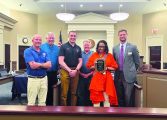By Page H. Gifford
Correspondent
Andi Cumbo will speak about her body of work in fiction and non-fiction when she visits the Friends of the Library on Sept. 6, at 10 a.m. Cumbo, who grew up in Fluvanna and graduated from FHS in 1993, went on to get her MA in literature and an MFA in creative writing. Her father was a manager down at a farm in Bremo, and her mom was the music director at Fork Union Baptist Church.
Many things inspire Cumbo’s writing but mostly she said, it’s places and geography, history, buildings, and the stories around them.
“I love learning the stories about abandoned places or old houses. I love hearing the folklore that carried people through hard times in those places.”
Author Anne Lamott’s books have had a significant influence on her writing style, she said. “I adore Anne Lamott, her sense of humor, her irreverence for sacred things. I’ve also read a lot of Toni Morrison, and her use of place in her stories is a big influence on me.”
Cumbo said she doesn’t have a writing routine since she runs two businesses and has a young son. But she tries to write 3,000 words every day – normally in a 1,000-word sprint. When her life was a little less full, she used to have the habit of lighting a candle and sitting at her desk to get her into writing mode but now she “grabs time on the couch or the kitchen table when I can.”
It is not unusual for a writer to write both fiction and non-fiction. Oftentimes, one complements the other, since non-fiction is reality and fiction is fantasy. Cumbo said that she is drawn to both because of the idea of place and history and how they influence people.
“Stories are sort of what makes me tick, so I enjoy them in whatever form,” she said. She added that she doesn’t necessarily adapt a writing style to fit both. “I have a sort of pile it on sort of voice, where I lay idea upon idea. I do that in both genres. It’s part of what ties all my work together.”
Using ACF Bookens as her pen name, she writes her cozy mysteries and has three series: one set in a bookstore, one set in a fictionalized version of Greene County, featuring an architectural salvage, and one that takes place in a different city for each book, where the sleuth is looking for a collectible book. Cumbo loosely bases her characters on people and eventually, she says, they become her people.
“But each of them starts as an angle on a person I know, like my dear friend Heather or my dad.” Cumbo also recognizes that dialogue is central to character development in fiction writing.
“I was fortunate to take some good classes on dialogue in school, so I learned quickly not to include filler or put information in that could be narration,” she said. “Now, I’ve learned what not to do in novels from watching TV, where they have to put everything in dialogue. Sometimes, it’s so forced.” Other than dialogue, she focuses on certain elements to create believable moments and characters in her stories. “It always comes back to place for me. I want the spirit and the geography of my places to feel real, to feel immersive. I want my readers to want to go there, to feel like they could be at home in the places I write.” She added that she is trying other genres and releasing a new romantic comedy in September, but would also like to write a formal history, but maybe in retirement when she has more time to do research.
In her non-fiction writing, she explains how she strikes a balance between providing enough details and avoiding information overload.
“It’s always tricky, but I find that if I stick to the thrust of the story, what matters about the people I’m describing, I can usually hit a good balance between detail and narrative.”
Writer’s block or the lack of inspiration is one of the many challenges facing writers. Cumbo has a good handle on the root cause many writers rarely admit to, including equating writer’s block with exhaustion or burnout. She says once she determines the cause, she takes a break, rests, or does something relaxing and inspiring.
Time management is another major problem and juggling motherhood, and a career is the only option.
“I have a lot of plates spinning, so it’s always difficult to carve out the mental space to write. And then finances. Just like everyone else, I have to figure out how to make a living for myself and my son. That’s not always easy.
Oftentimes, writers are riddled with self-doubt and have to figure out ways to maintain confidence in their work. Cumbo is grateful for the support of friends and readers. Sometimes, confidence is gained from the passion to create the work itself.
Cumbo’s advice for up-and-coming writers is they need to have a lot of determination, a willingness to learn, and a clear vision of their goals.
“If you have those things, you can find your way through the various publishing paths and get your book out into the world.” Keeping up with and navigating publishing’s ever-changing landscape is a must for every writer. Cumbo urged would-be writers to read a lot of industry news, talk with other writers, and listen to podcasts.
“I pay attention to what’s happening with my books – they’re usually a good indicator of shifts, at least in sales paradigms.”
Cumbo is always thinking about the next story or book.
“I think I’ll keep writing books in all the genres I currently write in, but I’d like to get back to research-based writing, more books about enslaved communities, about the history of Black Americans in general. At least that’s my hope.”




